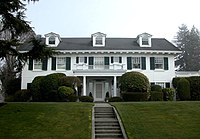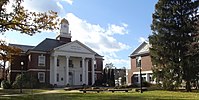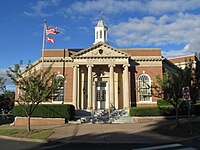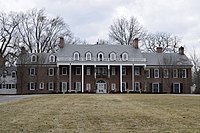
The Colonial Revival architectural style seeks to revive elements of American colonial architecture.
The beginnings of the Colonial Revival style are often attributed to the Centennial Exhibition of 1876, which reawakened Americans to the architectural traditions of their colonial past. Fairly small numbers of Colonial Revival homes were built c. 1880–1910, a period when Queen Anne-style architecture was dominant in the United States. From 1910–1930, the Colonial Revival movement was ascendant, with about 40% of U.S. homes built in the Colonial Revival style. In the immediate post-war period (c. 1950s–early 1960s), Colonial Revival homes continued to be constructed, but in simplified form. In the present-day, many New Traditional homes draw from Colonial Revival styles.
Although associated with the architectural movement, "Colonial Revival" also refers to historic preservation, landscape architecture and garden design, and decorative arts movements that emulate or draw inspiration from colonial forms.
Characteristics
While the dominant influences in Colonial Revival style are Georgian and Federal architecture, Colonial Revival homes also draw, to a lesser extent, from the Dutch Colonial style and post-medieval English styles. Colonial Revival homes are often eclectic in style, combining aspects from several of these previous styles.
Since Colonial Revival architecture pulls structural and decorative elements from other styles, there is not one single combination of elements that defines the style. However, some commonly found characteristics of Colonial Revival buildings include:
- Gabled, hipped, or gambrel roofs
- Broken pediments
- Symmetrical facades
- Double hung windows and shutters
- Fanlights and sidelights
Cyril M. Harris's American Architecture: An Illustrated Book noted that "Colonial Revival houses are usually the result of a rather free interpretation of their prototypes; they tend to be larger, may differ significantly from the houses they seek to emulate, and often exaggerate architectural details."
Gallery
-
Historic Robinson Hall on the Louisiana Tech University campus in Ruston, Louisiana, is named for the second president of the institution, William Claiborne Robinson
-
Colonial Revival post office in Hyattsville, Maryland
-
 Colonial Revival home of Henry M. Jackson in Everett, Washington
Colonial Revival home of Henry M. Jackson in Everett, Washington
-
Brown and Sypherd Residence Halls, University of Delaware. Much of the central campus is built in Colonial Revival style.
-
 The Little White House, Franklin D. Roosevelt's personal retreat near Warm Springs, GA
The Little White House, Franklin D. Roosevelt's personal retreat near Warm Springs, GA
-
 Mount Kisco Village Hall
Mount Kisco Village Hall
-
 Weiss Center, a town-owned facility in Manchester, Connecticut, was a former post office. It is made of brick with limestone trim and contains a portico.
Weiss Center, a town-owned facility in Manchester, Connecticut, was a former post office. It is made of brick with limestone trim and contains a portico.
-
 The Robert Stranahan residence in Toledo, Ohio, now a part of Wildwood Preserve Metropark
The Robert Stranahan residence in Toledo, Ohio, now a part of Wildwood Preserve Metropark
-
 Fairmont Senior High School, a public secondary school in Fairmont, West Virginia
Fairmont Senior High School, a public secondary school in Fairmont, West Virginia
-
 The Brooklyn College Library, designed by architect Randolph Evans
The Brooklyn College Library, designed by architect Randolph Evans
See also
- Colonial Revival garden
- Dutch Colonial Revival architecture
- Mission Revival Style architecture
- New Classical architecture
- Spanish Colonial Revival architecture
- Wallace Nutting
- Colonial Williamsburg
Further reading
- Alan Axelrod, ed. The Colonial Revival in America. New York: W.W. Norton, 1985.
- William Butler, Another City Upon a Hill: Litchfield, Connecticut, and the Colonial Revival
- Karal Ann Marling, George Washington Slept Here: Colonial Revivals and American Culture, 1876–1986, 1988.
- Richard Guy Wilson and Noah Sheldon, The Colonial Revival House, 2004.
- Richard Guy Wilson, Shaun Eyring and Kenny Marotta, Re-creating the American Past: Essays on the Colonial Revival, 2006.
References
- ^ McAlester, Virginia Savage (2015-11-10). A Field Guide to American Houses the Definitive Guide to Identifying and Understanding America's Domestic Architecture (Revised ed.). New York: Knopf. pp. 3, 68, 414. ISBN 9780375710827.
- Brinkley, M. Kent; Chappell, Gordon W.; Doody, David M., eds. (1996). The gardens of colonial Williamsburg. Williamsburg, Va: Colonial Williamsburg Foundation. p. 3. ISBN 978-0-87935-158-8.
- ^ "Architectural Style Guide". Historic New England. Retrieved 2024-02-05.
- Schagrin, Danielle Lehr. "Colonial Revival". Encyclopedia of Greater Philadelphia. Retrieved 2024-02-05.
- Harris, Cyril M., ed. (1998). American architecture, an illustrated encyclopedia. New York: W. W. Norton & comp. ISBN 978-0-393-73029-6.
| Architecture of the United States | |
|---|---|
| Native and indigenous | |
| Colonial and post-colonial | |
| Early Republic | |
| Mid-19th century | |
| Victorian | |
| Late-19th to mid-20th century |
|
| Post–World War II | |
| Building types and vernacular |
|
| Cities | |
| States | |
| Historicism and Revivalism in architecture and decorative arts | |
|---|---|
| International |
|
| France | |
| Germany, Austria-Hungary | |
| Great Britain | |
| Greece | |
| Italy | |
| Netherlands | |
| Nordic countries | |
| Portugal | |
| Poland | |
| Romania | |
| Russian Empire and USSR | |
| Serbia | |
| Spain | |
| United States | |
| History of architecture | |
|---|---|
| BCE | |
| 1st millennium | |
| 1000–1500 | |
| 1500–1750 | |
| 1750–1900 | |
| 1900–1950 | |
| 1950–2000 | |
| 2000–present | |
| Regional | |